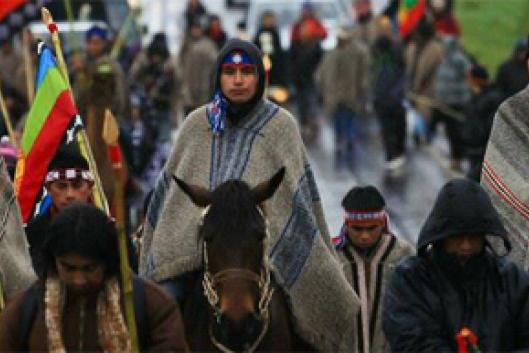Historically, relations between Mapuche indigenous communities and the forestry industry have been marked by conflict, primarily because of the expansion of industrial tree plantations on lands that are part of the Mapuche territory and the impact of these plantations on the communities’ habitat.
There are three business groups that control most of the forestry industry in Chile: Forestal Arauco, Compañía Manufacturera de Papeles y Cartones (CMPC) and MASISA. According to figures from 2007, these three companies owned a total of 1,715,910 hectares of tree plantations in Chile, mainly in the regions of Biobío, La Araucanía, Los Ríos and Los Lagos. In these same regions, tree plantations in the traditional Mapuche territory account for an area three times greater than the indigenous lands recognised by the state.
Most of the tree plantations have been established on traditional Mapuche lands. The communities affected by this industry are claiming their right to tenure over the lands occupied by the plantations, which were usurped from them both during the colonial era and following the military coup of 1973.
“Usurped lands”
“Usurped lands” refers to lands claimed by the Mapuche as belonging to them which were allocated by the state to private parties or which, in other cases, were effectively usurped by private parties – primarily tree plantation companies – despite the existence of indigenous land tenure titles.
Currently, the Forestry Promotion bill, which modifies and extends Decree Law 701 – the legislation that regulates and provides incentives for the tree plantation industry – is aimed at expanding this activity towards small producers, by making available funds to them. But this does not mean that small producers will be given priority over big companies. On the contrary, due to the shortage of available land for the industry, largely owing to the fact that this land is designated as indigenous land or is made up of very small landholdings, the goal is to promote a redirection of production among indigenous and non-indigenous peasant farmers, who would end up growing trees for the big companies, which would set the prices and purchase their output.Although there was subsequently a timid policy of restitution of land to indigenous peoples, it did not go far enough, and the problem of land conflicts continues.
This is why the industrial tree plantation model of forestry has been and continues to be an invasive process for Mapuche society, because these plantations exert pressure on the availability of land and alter territorial spaces as well as the social-spatial relations of Mapuche communities. The advance of the tree plantation industry results in the colonization of the territory and obliges Mapuche communities and small landowners to give up their ways of life and customs, forcing them to establish tree plantation micro-enterprises or to work as salaried employees of the plantation companies.
Nevertheless, Mapuche communities have not backed down in their efforts to reclaim their rights over their traditional territory, including land tenure and control over the territory, in order to exercise the right to establish their own priorities for development and to have access to the natural resources necessary to ensure their organized existence as a people.
Faced with a law whose objective has been to reduce their territories, in addition to land claim mechanisms that have destroyed indigenous peoples’ faith in state institutions and land conflict resolution mechanisms that have proven ineffective, Mapuche communities – who have never been able to rely on effective institutional mechanisms for state protection of their rights – have resorted to the “occupation” of landholdings to demand their territorial rights and give visibility to their conditions of exclusion and the denial of their rights. There are many cases of the occupation of indigenous lands that are currently under the control of tree plantation companies and under dispute.
These conflicts have resulted in extreme situations of the criminalization of community members and leaders who have occupied disputed landholdings, due to the categorization of their actions as crimes. This has opened the way for criminal court proceedings against organizations, indigenous communities and their members and leaders, who are accused of committing common crimes established in the Penal Code such as arson, unlawful association, issuing of threats and cattle rustling. In many cases the accused have ended up imprisoned and publically vilified. In addition, emergency laws such as the anti-terrorist law and domestic security law have been invoked, enabling the courts to step up the penalties imposed for common crimes and withhold guarantees of due process.
The Chilean government policy on the forest resources of the Mapuche people continues to be one of exclusion and imposition in a context of the rapid loss of forests and the biodiversity associated with them, which is observed today in Mapuche territory as a consequence of the expansion and proliferation of industrial monoculture plantations of exotic tree species.
Extracted and adapted from the working paper “Pueblo mapuche y recursos forestales en Chile: devastación y conservación en un contexto de globalización económica”, José Aylwin, Nancy Yáñez, Rubén Sánchez; Observatorio Ciudadano IWGIA,http://www.observatorio.cl/sites/default/files/biblioteca/pueblo_mapuche_y_recursos_forestales_en_chile
_devastacion_y_conservacion_en_un_contexto_de_globalizacion_economica.pdf
